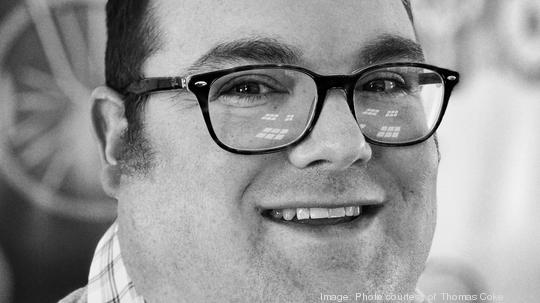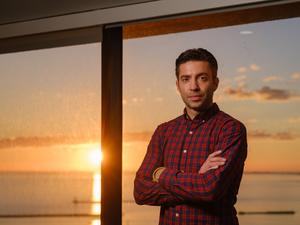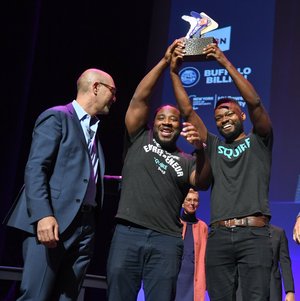
Why would a local startup bring on a COO from Grand Rapids?
Thomas Coke’s passion for college sports and his lengthy resume in startups made him a perfect fit for Dalorum, an online community that offers resources to student-athletes, including sponsorship opportunities for their “name, image, likeness,” or NIL.
Coke started at Dalorum in August, working with its founder Max Brie, a student athlete at St. Bonaventure. They met through a mutual connection, Brie said.
“He brings a ton of experience, and he’s been crucial to us getting to where we are,” Brie said.
Coke runs a student business accelerator program at Grand Valley State University in Allendale, Michigan. He also runs his own startup that he launched in January, Varsity Gems, which offers NFTs for college athletes.
The way it works is when the student athletes provides a number of images, Varsity Gems creates a digital trading card and sell it for $100. The athlete gets 75% of the proceeds at no cost to them.
“It’s essentially their digital rookie card,” Coke said. “NFTs in general have plummeted, but in sports, they’ve stayed pretty solid.”
Coke’s career began as a securities regulator for the state of Michigan. He's always had a passion for entrepreneurship.
In 2013, he worked for VerifyValid, a startup that created the first check you could send via email. The company grew from seven employees to 30, before it was acquired a year later by Deluxe, a large check-writing company.
In 2015, Coke started Campus Starter, a business kickstarter for college students. He ran it for six months before it was acquired by a British digital fundraising company, Hubbub.
Coke played football and rugby in college, and now, his son, Alex Hugh-Plott, does track and high jumps at Oakland University. That’s why Coke takes seriously the challenges student athletes face.
“The pressure mounts,” Coke said. “Maybe you’re on a scholarship, and you’re away from home for the first time without a support system or with a different support system, and a lot of things are happening at once. A lot of your time is already taken up with being a student athlete.”
That’s why Dalorum, and work promoting NIL opportunities for athletes, was attractive to him. For example, Coke’s son can now make money running high jump clinics with his own personal brand.
“We want to highlight the kids who are academically focused and high achievers in other avenues and give them a showcase,” Coke said. “We’re creating a community where they’re all connected, where they can learn what other athletes are doing that works.”
Dalorum’s early focus has been on providing mental health options for student athletes.
“I think we put a lot of pressure on young people in general, but athletes in particular,” Coke said. “Mental health is a focus in college sports because there’s been a number of suicides. We’ve seen these mental health struggles go on, so I think that’s why it’s a great starting point for Dalorum.”







